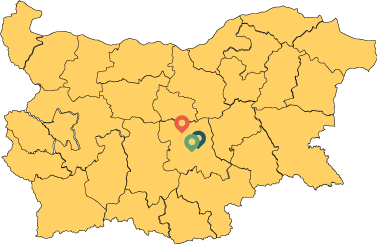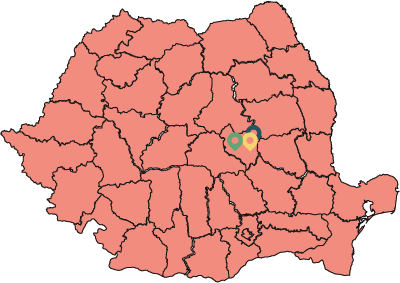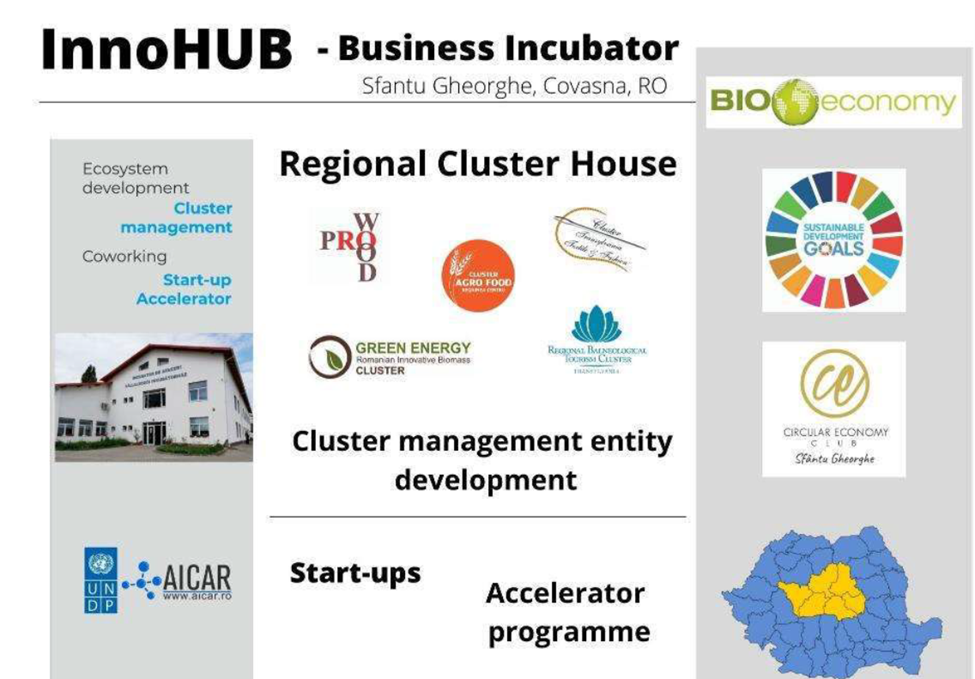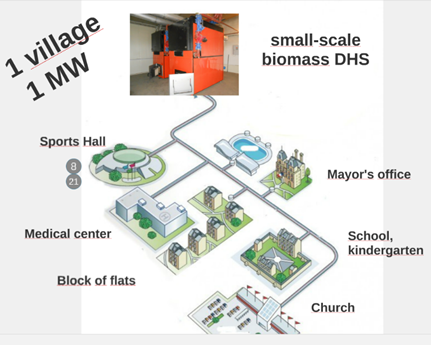

Please rotate your phone to start the experience
Vă rugăm să rotiți telefonul pentru a începe experiența
Моля, завъртете телефона си, за да започнете изживяването
Discover innovative bio-based products such as shoes made from algae, food made of insects or phone displays made from sugar! Learn about bio-based innovations from across Europe and how the bioeconomy can contribute to achieving the Sustainable Development Goals (SDGs).
Food of the future?
Clothes made of milk?
Shoes made of pineapple?







Before we start, these icons will appear throughout the site. Click on them and discover the information

HORIZONTAL SCROLL
just scroll to navigate
HOTSPOTS
click to discover
QUIZ
test your knowledge







Get your edible insects!
sustainable development goal 2 and the bioeconomy
Reduced emissions insect burger!
Drink beer and save bread!
Grow a brick!
Clean with the power of enzymes
sustainable development goal 9 and the bioeconomy
sustainable development goal 12 and the bioeconomy
100% apple leather
Spider technology
Sale on pineapple shoes!
Dress in milk!
Dress in roses!
sustainable development goal 14 and the bioeconomy
Dress in the ocean
sustainable development goal 15 and the bioeconomy
Find out how the rural regions of Stara Zagora, Bulgaria and Covasna, Romania are working towards developing similar innovative and bio-based products.
LET'S SEE WHAT YOU LEARNED

At the heart of BE-Rural is supporting regional actors in the participatory development of regional bioeconomy strategies and roadmaps. Based on a bottom-up approach, Stakeholder Working Groups (SWG) were established in the regions of BE-Rural. Building on the knowledge exchange and guidance provided and generated throughout the duration of the project, the regional SWGs developed strategy and roadmap documents for strengthened regional bioeconomies in the respective regions.
Learn more about the region of Stara Zagora, Bulgaria and its bioeconomy strategy here

What do you think about the strategy?

Stara Zagora’s economy is dominated by a mix of small- and medium sized enterprises and, as such, one of the main priorities of the strategy is creating conditions for the development and strengthening of bio-based sectors and promoting the introduction of new technologies. It further focuses on the potential of agriculture and forestry for the region and aims to promote different approaches for sustainable resource management and strengthen the links between bioeconomy and regional development. While Bulgaria has not yet developed a national strategy for the development of the bioeconomy, the Ministry of Agriculture, Food and Forestry (MAFF) is working on a National Bioeconomy Strategy for the Agriculture Sector (incl. agriculture, forestry and fishery) and the bioeconomy is addressed in the development path “Green and Sustainable Bulgaria” of the National Development Programme until 2030.
Relevant multimedia links

The cultivation of essential oils and medicinal crops is especially important in the Stara Zagora District and the Strategy document. Due to the specific combination of very favourable soil and climatic conditions in the Kazanlak Valley, the area is known for the cultivation of essential oilseeds and the production of the highest quality rose oil which meets an internationally recognized quality standard. Growing medicinal crops, too, is essential, as Bulgaria has a leading position in Europe in the export of dried herbs.

Bulgaria is implementing the national scientific program “Healthy foods for a strong bioeconomy and quality of life”, whose main purpose is stimulating targeted research and policies in the field of agriculture, food and bioeconomy. This will help address the three main challenges these sectors face today: ensuring sustainable food production in response to growing global demand, ensuring sustainable management of natural resources and climate action as well as a balanced development of the bioeconomy of rural areas and their communities. The Thracian University, located in Stara Zagora, is part of the consortium implementing the program and was a key contributor to the development of the bioeconomy strategy for Stara Zagora, thereby generating synergies and ensuring complementarities with national-level activities.
The Business Incubator Go-Up located at the Trakia University is a prime example of the innovative potential of the region. Simultaneously, a number of successful small-scale bioeconomy models exist in Bulgaria already.
Take for example, a start-up company from Stara Zagora with an innovative solution to a significant environmental problem – the increasing amounts of sludge from municipal wastewater treatment plants. Scientists from Thracian University are co-founders of the company “Atlas Agro Science”, which seeks to reduce the inefficient disposal of sludge from treatment plants and the growing use of mineral fertilisers in agriculture. By implementing an innovative patented technology and applying the principles of the circular economy, they developed products using completely waste-free technology, which are completely safe for the environment.
Or the example of Damascena Ltd., a successful Bulgarian company in the field of production of essential oils and natural cosmetics. The distillery established in the village Skobelevo (Rose Valley, near Kazanlak and Pavel Banya) produces rose oil, obtained from their plantations of Rosa damascene as well as rose water, lavender oil, lavender water, pink absolute and pink concrete for perfumery purposes, cosmetics, pharmacy and food industry.
Relevant multimedia links
At the heart of BE-Rural is supporting regional actors in the participatory development of regional bioeconomy strategies and roadmaps. Based on a bottom-up approach, Stakeholder Working Groups (SWG) were established in the regions of BE-Rural. Building on the knowledge exchange and guidance provided and generated throughout the duration of the project, the regional SWGs developed strategy and roadmap documents for strengthened regional bioeconomies in the respective regions.
Learn more about the region of Covasna, Romania and its bioeconomy roadmap here

What do you think about the strategy?

In Romania the development of the roadmap was strongly driven by innovation clusters, which are well established in the region. Its main objective is to foster a qualitative and sustainable way of living in the region by laying out specific actions for harmonised rural development, social inclusion and eco-innovation.
Romania does not have a national bioeconomy strategy, but the Centru’s RIS3 (2021–2027) addresses 5 cross-sectoral themes, including the theme of sustainable economy. In addition, references to bioeconomy are made in the Regional Development Plan of the Centru region 2021– 2027. This cross-sectoral regional trend is in line with national efforts, in which several government institutions, such as the Government Department of Sustainable Development, the Ministry of Agriculture, the Ministry of Environment and the Ministry of Economy, are getting involved.
Relevant multimedia links

Covasna represents the cradle of the clustering process in Romania. Several clusters: 1) Pro Wood Regional Wood Cluster, 2) Green Energy Innovative Biomass Cluster, 3) Transylvania Textile & Fashion Regional Cluster, 4) Agrofood Regional Cluster, 6) Transylvania Regional Balneotourism Cluster are part of the business incubator of Sf. Gheorghe, which represents the main innovation actor in the region.
Watch this video for an introduction into the work of the Sfantu Gheorghe Business Incubator – a remarkable synthesis of joint efforts, crowned by the organization of BE-Rural World Café! The video gives a glimpse of the BE-Rural World Café in September 2021, organized by IPE in collaboration with ASIMCOV, on the occasion of European Green Week. This event contributed decisively to the completion of the Roadmap for a Bioeconomy Strategy in Covasna County in Covasna.
The Roadmap for a Bioeconomy Strategy in Covasna County further seeks to increase the competitive advantage of the region by supporting bio-innovators in local economic activities. Find out more about Bio-Innovators in the area here.

The roadmap sets out to build off of successful bioeconomy business models such as the ”1 village 1 MW” integrated model of a community-scale-energy system developed in the Estelnic and Ghelința Communes. Small-scale bioenergy systems are plants of up to 1 MW of energy generating capacity, which have the advantage of being able to be distributed throughout a community.
Choose a category
*Sustainable Development Goal







































































